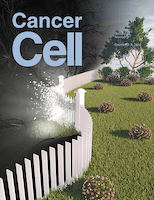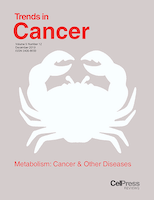
CANCER AND METASTASIS REVIEWS
Scope & Guideline
Transforming Insights into Effective Therapies
Introduction
Aims and Scopes
- Mechanisms of Cancer Metastasis:
The journal extensively covers the biological mechanisms underlying cancer metastasis, including cellular signaling pathways, genetic alterations, and the role of the tumor microenvironment. - Immunotherapy and Targeted Therapy:
A significant focus is placed on the development and application of immunotherapies and targeted therapies, exploring their mechanisms of action, efficacy, and resistance in various cancer types. - Cancer Cell Plasticity and Heterogeneity:
Research on cancer cell plasticity, stemness, and tumor heterogeneity is a core area, highlighting how these factors contribute to treatment resistance and disease progression. - Biomarkers and Therapeutic Targets:
The journal emphasizes the identification and validation of biomarkers for early detection, prognosis, and therapeutic targeting, aiming to enhance personalized medicine approaches. - Role of the Microbiome and Metabolism:
Emerging themes include the influence of the microbiome on cancer progression and therapy response, as well as the metabolic adaptations of cancer cells. - Clinical Implications and Translational Research:
The journal seeks to bridge the gap between basic research and clinical applications, providing insights into how laboratory findings can inform clinical practice and improve patient outcomes.
Trending and Emerging
- Microbiome and Cancer Interactions:
There is a growing interest in the role of the microbiome in cancer initiation, progression, and response to therapy, highlighting how microbial communities can influence tumor biology. - Innovations in Immunotherapy:
Immunotherapy continues to be a major focus, with emphasis on novel immune checkpoint inhibitors, CAR T-cell therapies, and their applications in various cancer types, particularly in solid tumors. - Metabolic Reprogramming in Cancer:
Research into the metabolic adaptations of cancer cells and their implications for therapy is on the rise, reflecting a deeper understanding of cancer metabolism's role in tumor growth and resistance. - Tumor Microenvironment Dynamics:
The interactions between tumor cells and their microenvironment, including immune cells, stromal cells, and extracellular matrix components, are increasingly recognized as critical in cancer progression and therapy. - Cancer Cell Plasticity and Drug Resistance:
Emerging studies are focusing on the plasticity of cancer cells and their ability to adapt to therapeutic pressures, contributing to drug resistance and treatment failure. - Epigenetic Regulation in Cancer:
Research on epigenetic modifications and their role in cancer progression and treatment response is gaining traction, providing new avenues for therapeutic intervention.
Declining or Waning
- Traditional Chemotherapy Mechanisms:
Research specifically focused on traditional chemotherapy mechanisms has become less prevalent, as there is a growing emphasis on novel therapeutic approaches, such as immunotherapy and precision medicine. - Basic Cellular Biology without Context of Cancer:
Studies centered on basic cellular biology that do not directly relate to cancer mechanisms or treatment implications are appearing less frequently, indicating a shift towards more applied research. - Single-Agent Therapies:
The trend towards combination therapies and multi-modal approaches has overshadowed research focused solely on single-agent therapies, which may be seen as less effective in the context of complex cancer biology. - Historical Perspectives on Cancer Treatments:
Papers that provide historical overviews of cancer treatments without new insights or contextual relevance are decreasing, as the field moves towards more forward-looking research.
Similar Journals

Oncologie
Pioneering insights in the fight against cancer.Oncologie is a distinguished academic journal published by WALTER DE GRUYTER GMBH, focusing on the dynamic and vital field of oncology. Established in 1999 and continuously published until 2024, this journal provides a platform for high-quality research and advancements in cancer treatment, prevention, and diagnosis. With an ISSN of 1292-3818 and an E-ISSN of 1765-2839, it is indexed in various databases, contributing to its growing visibility. Although categorized in the Q3 quartile for oncology research as of 2023, Oncologie offers essential insights and fosters scholarly dialogue among researchers, professionals, and students interested in oncology. Its unique contributions aim to bridge the gap between theoretical frameworks and clinical applications, making it a valuable resource for those seeking to advance their knowledge and expertise in cancer research.

Journal of the National Cancer Center
Pioneering Insights for a Cancer-Free Tomorrow.Journal of the National Cancer Center, published by Elsevier, serves as a pivotal platform in the fields of Cancer Research, Hematology, and Oncology. With an ISSN of 2667-0054, this esteemed journal is recognized for its exceptional quality, achieving a Q1 ranking in all categories as of 2023. Its impressive Scopus rankings place it among the top journals in its field, notably holding rank #11 in Medicine - Hematology and rank #36 in Medicine - Oncology. Addressed from Amsterdam, Netherlands, the journal aims to disseminate cutting-edge research and innovative findings that advance the understanding and treatment of cancer, bridging gaps between laboratory discoveries and clinical applications. Although it follows a subscription model, the journal's commitment to accessibility ensures that valuable knowledge reaches healthcare professionals and researchers globally. By fostering collaboration and facilitating knowledge exchange, the Journal of the National Cancer Center is indispensable for those dedicated to combating cancer and enhancing patient care.

NEOPLASMA
Elevating Knowledge in Oncology and BeyondNEOPLASMA is a prominent journal published by AEPRESS SRO, dedicated to the multifaceted field of oncology and cancer research. Since its inception in 1957, this esteemed publication has served as a vital platform for advancing the understanding of neoplastic diseases, disseminating high-quality research findings that contribute to clinical and laboratory advancements. Operating under a robust framework of peer review, NEOPLASMA holds significant credibility, as evidenced by its Q2 ranking in the Medicine (miscellaneous) category and Q3 rankings in both Cancer Research and Oncology for 2023. Furthermore, with an ISSN of 0028-2685 and E-ISSN 1338-4317, the journal fosters accessibility to valuable scientific content despite the absence of open access options. Positioned in Bratislava, Slovakia, NEOPLASMA continues to attract a global readership, making substantial contributions to the fields of biochemistry, genetics, and molecular biology as highlighted by its Scopus rankings. This journal is essential reading for researchers, professionals, and students looking to stay abreast of the latest developments in cancer research and treatment strategies.

BRITISH JOURNAL OF CANCER
Shaping the Future of Oncology Through Quality Scholarship.The British Journal of Cancer, published by SpringerNature, stands as a preeminent resource in the fields of Cancer Research and Oncology, with a distinguished history of publication dating back to 1947. With its Q1 rank in both categories for 2023, this journal is among the top-tier publications, offering cutting-edge research and insights into the biology, etiology, and treatment of cancer. The journal’s rigorous peer-review process ensures that readers are presented with high-quality studies that contribute to the advancement of cancer knowledge and clinical practice. Operating from the United Kingdom, it has garnered a notable impact factor and ranks impressively within Scopus, making it an essential publication for researchers, healthcare professionals, and students who are dedicated to understanding cancer's complexities. Access to the journal's articles is available in traditional formats, providing a versatile platform for disseminating pivotal research. As we move towards a future where cancer treatment and prevention remain crucial, the British Journal of Cancer continues to play a vital role in shaping the dialogue and discoveries within the oncology community.

Journal of Cancer Metastasis and Treatment
Empowering researchers with vital oncology knowledge.Journal of Cancer Metastasis and Treatment, published by OAE PUBLISHING INC, stands as a vital resource in the field of oncology, focusing on advancements and research pertaining to cancer metastasis and treatment methodologies. With an ISSN of 2394-4722 and an E-ISSN of 2454-2857, this journal aims to serve as a comprehensive platform for sharing innovative research, critical analyses, and novel findings from 2019 through 2024. As indexed in Scopus, it holds a notable Q3 ranking within its category, positioned at 240/404 and within the 40th percentile, thus reflecting its growing significance in the scientific community. Though currently not open access, the journal aspires to improve accessibility to pivotal oncology research, making it an essential tool for researchers, clinicians, and students keen on unraveling the complexities of cancer treatment and metastasis. Its commitment to promoting high-quality studies plays a crucial role in the ongoing quest to enhance patient care and outcomes in cancer treatment.

CANCER CELL
Where Excellence Meets Cancer ResearchCancer Cell, published by Cell Press, represents a pinnacle of research in the fields of cancer research, cell biology, and oncology. With an impressive Impact Factor and ranking as Q1 in prestigious categories for both 2023 and previous years, this journal stands out as a vital resource for professionals and scholars dedicated to understanding the molecular underpinnings of cancer. Operating from Cambridge, MA, Cancer Cell has been an essential platform for innovative studies since its inception in 2002. Although it is not an Open Access journal, its rigorous peer-review process ensures that only the highest quality research is disseminated to the scientific community. Readers can expect to find a wealth of knowledge ranging from cutting-edge therapies to insights into tumor biology, thereby contributing significantly to the advancement of oncology. With rankings placing it among the top echelons of related fields—#2 in Cancer Research and #6 in Oncology—Cancer Cell is an indispensable reference for anyone committed to the fight against cancer.

Molecular & Cellular Oncology
Exploring the cellular mechanisms of oncogenesis.Molecular & Cellular Oncology, published by Taylor & Francis Inc, is a vital academic journal dedicated to the exploration of cancer biology through the lens of molecular and cellular mechanisms. Since its inception in 2014, the journal has played a crucial role in disseminating innovative research findings that address the fundamental aspects of cancer research and molecular medicine. With its current ranking in Scopus placing it in the Q3 quartile for both Cancer Research and Molecular Medicine, the journal provides a platform for groundbreaking studies that push the boundaries of our understanding of oncogenesis and therapeutic interventions. Although the journal operates under a subscription model, its dedication to high-quality peer-reviewed research makes it an essential resource for researchers, professionals, and students aiming to contribute to or stay updated in the rapidly evolving field of oncology. As we approach the culmination of its converged years in 2024, Molecular & Cellular Oncology aims to continue fostering collaborations and insights that advance cancer research on a global scale.

Cancer Communications
Fostering Global Collaboration in Cancer ScienceCancer Communications, published by WILEY, is a leading open-access journal that has positioned itself at the forefront of cancer research and oncology since its inception in 2017. With an impressive HIndex reflective of its scholarly impact and recognized in the Q1 category for both Cancer Research and Oncology as of 2023, this journal consistently ranks in the top echelons of its field, specifically at Rank #16/404 and Rank #13/230 in their respective categories on Scopus. Cancer Communications aims to disseminate cutting-edge research findings, innovative methodologies, and significant advancements in cancer treatments, thereby fostering a deeper understanding of oncology among researchers, healthcare professionals, and students. The journal operates under an Open Access model since 2018, ensuring that vital research is accessible to a global audience, thus enhancing collaboration and knowledge sharing necessary to tackle one of the most pressing health challenges of our time. Located in Hoboken, NJ, United States, and with a strong commitment to scientific excellence, Cancer Communications remains an essential resource for anyone engaged in the fight against cancer.

Annual Review of Cancer Biology
Transforming Insights into Cancer BiologyAnnual Review of Cancer Biology is a pivotal journal published by Annual Reviews, specializing in the rapidly evolving field of cancer research. With an impact factor positioned in the distinguished Q1 quartile of Cancer Research, Cell Biology, and Oncology categories, this journal ensures that it showcases the highest quality of scholarly contributions. Indexed in Scopus, it ranks among the top in its fields, reflecting its strong influence and relevance, with remarkable percentiles indicating its esteemed position within the research community. Although not an open-access journal, it provides a comprehensive platform for advancing the frontiers of cancer biology through rigorously curated reviews, highlighting key developments, breakthroughs, and future directions that inform both academia and clinical applications. As a valuable resource for researchers, professionals, and students, the Annual Review of Cancer Biology serves as an essential guide for understanding and addressing the complexities of cancer biology today.

Trends in Cancer
Advancing Cancer Research with Insightful InnovationsTrends in Cancer is a leading journal published by CELL PRESS, dedicated to advancing the field of cancer research and oncology. Since its inception in 2015, the journal has rapidly gained a reputation for excellence, securing both Q1 rankings in Cancer Research and Oncology categories for 2023 and boasting impressive Scopus ranks—#13 out of 404 in Medicine Oncology and #9 out of 230 in Biochemistry, Genetics and Molecular Biology, thus placing it in the top 4% of its field. The journal aims to publish high-quality, innovative research that offers new insights into cancer biology and treatment strategies. With a commitment to scholarly rigor and a broad scope that encompasses molecular mechanisms to therapeutic approaches, Trends in Cancer serves as an essential resource for researchers, professionals, and students eager to stay informed about the latest developments in cancer science. Although it is not an open-access journal, its contributions are pivotal in shaping the future of cancer research.